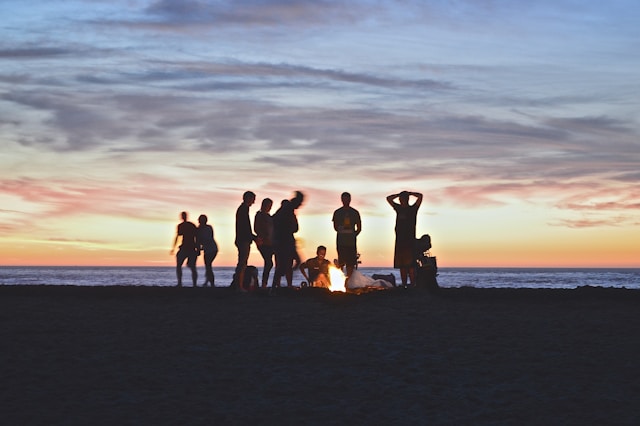
Residents spoke before the Coronado City Council for more than an hour on April 16, addressing beach fires.
Some wanted them banned, some wanted them preserved, some asked for a compromise between the two. Some audience members clapped, others murmured, and some prompted Mayor Pro Tem Casey Tanaka to ask for decorum.
Ultimately, the council decided to ban fires on South Beach, the narrow strip of sand in front of the Coronado Shores condominium buildings. The city will allow personal fires in either smokeless wood-burning stoves or propane fire pits on the rest of its beach.
The eight city-provided fire rings will also remain available for fires, but beachgoers must burn clean wood.
Mayor Richard Bailey, who participated remotely, cast the only vote of dissent for the policy, saying he didn’t think it was fair to allow wood fires in city rings, which many believe are used more by visitors than residents, but not elsewhere. The policy, he argued, affords the ability to burn wood fires on the beach only to nonresidents.
The new policy was a compromise between two vehement stances: Those who said beach bonfires are an iconic part of life in California and those who said the smoke from fires is inundating their homes and harming their health and the environment.
It was also a departure from a February decision to restrict beach fires to city-provided rings, which sparked debate.
“I think I got it wrong at the last meeting,” said Council Member Casey Tanaka, who was acting as mayor pro tem. “I think the part I got right is that smoke is a real issue. (…) I don’t think we got it wrong in terms of taking that issue seriously and trying to take action.”
What he thought the council got wrong, he said, was not considering the smokeless stove option, which Bailey suggested in February. Council Member John Duncan, who originally brought the issue to council, was also amenable to the idea of smokeless devices, but Tanaka said he didn’t want to approve an option he did not know much about.
During a staff presentation, the smokeless option was explained: It’s a portable device that uses secondary combustion to eliminate smoke.
Council Member Carrie Downey said she bought a Solo Stove, a smokeless bonfire product, ahead of Tuesday’s meeting to see how it worked.
“It’s not smokeless, it is less smoke,” she said, explaining that fires still emit smoke when they are first ignited.
Considering that, Downey suggested a geographic ban to keep all fires from the narrow South beach and push them onto Central and North beaches, which are much wider and allow for fires that are not as close to residences.
Council Member Mike Donovan agreed, and pushed to also allow propane fire pits. He also suggested that the city implement a reservation system for its city-provided rings to improve resident access. City staff will return to the council with an analysis of the matter, although City Manger Tina Friend said preemptively that she didn’t think reservations would be logistically feasible.
A challenge council members faced was finding a way to allow beach bonfires without concocting a policy so complicated that it was impossible to understand or enforce.
Most cities in San Diego County have already banned beach fires.
“(Allowing fires) is more that we have to manage, it’s more that we have to enforce,” Tanaka said. “And that’s why all these cities have banned them: It’s an easier policy to maintain and it’s an easier one to understand and explain. But sometimes, easy isn’t best.”
During deliberation, two frontrunner options emerged: Banning all fires on South Beach, and allowing personal fires everywhere else, or banning fires from South Beach and allowing all personal fire pit devices (the current policy) elsewhere.
Council ultimately decided on the later.
The policy won’t come into effect yet: City Council must first approve a new ordinance at two public hearings at future meetings.
After that, the new policy will go before the California Coastal Commission, an agency that, among other things, is tasked with maintaining access to state beaches.
It could take up to a year for the CCC to decide whether to approve the change, and until then, the current beach fire policy, which allows portable wood-burning fire pits on all beaches, will stand.
Duncan, who filed a Policy No. 2 request to bring the matter of beach fires before the council, said he appreciated the council’s willingness to find a solution that caters to both sides.
“I’m very willing to do the compromises that were mentioned,” he said, “because I think we should be reasonable to people’s concerns.”




